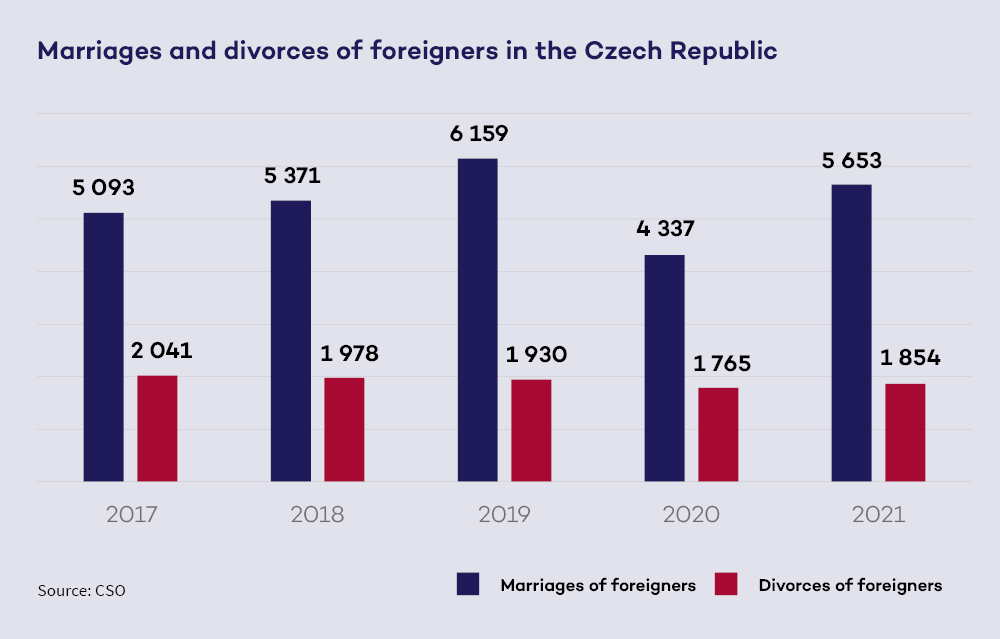Love knows no borders and thanks to travelling, studying, and working abroad, relationships with partners from countries other than the Czech Republic are now quite common. Couples in love, however, do not always realise that cultural differences can also mean big legal differences. That can raise quite significant problems affecting property relations and childcare.
Holidays, studying, working abroad, and travelling across continents – we are now completely used to all of it and it is now a normal that many people find a partner during such trips. A total of 12% of marriages in the Czech Republic in 2021 were concluded with a foreign partner, with over 5,500 such marriages in the same year. However, couples in love do not always realise that the cross-border factor might not only spice their relationship up, but it can also bring quite significant future problems.
Cultural vs. legal differences
Minor or major cultural differences are usually not perceived as nor considered to be a problem by partners at the beginning of the relationship: they may even find them attractive. It is different from the legal point of view. In particular, the different approaches to marriage, matrimonial property law, or parenting in different countries are fundamental. Religious issues and the overall legal-political setting also play an important role. Thinking ahead about all aspects of mutual cohabitation and possible separation can eliminate many future problems.
For all these reasons, it is advisable to consent to ideas about future mutual cohabitation in a prenuptial agreement, and consider not only property. The legal possibility and enforceability of such arrangements are always important issues in these international cases.
A dream wedding or limping marriage?
A partnership with an international element is always influenced in the legal context by the applicable law, i.e. the law to be applied to resolve the individual issues, including the determination of the competent court to resolve them.
The conclusion of marriage abroad or entering into marriage with a foreigner is therefore not as simple as it might seem to be at the first sight. Before an international marriage, it is necessary to always find out first what are the conditions for marriage in the perspective countries. Even having a dream destination wedding (Mauritius, Las Vegas, Paris, London, etc.) is not possible without a prior administrative process and obtaining a so-called certificate of legal capacity to marry.
Without taking the necessary administrative legal steps, a so-called limping marriage might come into existence, valid only in the territory of one state.
Moreover, a marriage contracted abroad has legal effects in the Czech Republic only after registration in a special registry office in Brno. Without taking the necessary administrative legal steps, a so-called limping marriage might come into existence, valid only in the territory of one state.
A preventive consultation before the wedding is not only worthwhile for these, but also for property issues. The laws of individual states differ significantly concerning matrimonial property law and the Czech institution of a community of property ("SJM") is unknown and difficult to grasp in many states.
Contract in advance
The property aspects of marriage are therefore ideally dealt with fully consciously before marriage. The spouses can choose the applicable law and if they choose Czech law, they also choose the institution of a community of property with all its requisites, including the possibility to conclude a prenuptial agreement as known in Czech law.
Negotiating terms before the wedding can often bring negative emotions or feelings of mistrust, but if the couple overcomes them, they will gain the stability and security they need for the future. It is, however, not too late even after the wedding – the property regime can be contractually adjusted within the framework of the community of property even during the marriage. In any case, we can confirm that, in the event of divorce, significantly more disputes arise in couples who have not resolved the matrimonial property regime as a precaution.
And this is doubly true in international relations. In practice, we can give an example of a Czech-German relationship where the spouses did not have a contractually regulated property regime. Part of the property was governed by the Czech community of property regime and other Czech laws, while another part was governed by German law and the so-called Zugewinngemeinschaft, which is different from the Czech community of property. The different legal regulations and the different expectations of the spouses led to deeper and more complicated conflicts, which could have been resolved by a prenuptial agreement before the wedding.
Prevention is therefore essential. On the other hand, without knowing the specific circumstances, it is not possible to generalise whether Czech or foreign law is always appropriate or whether to maintain or change the community property regime. Early consultation and clarification of the rules in advance can ensure that the couple's property interests are adequately protected in the future.
If it doesn't work out
The international element also plays a crucial role in the case of divorce. An average of 1,900 foreigners have divorced in the Czech Republic in recent years. In total, there were more than 9,500 divorces with an international element in the Czech Republic between 2017 and 2021, representing more than 8% of all divorces in the Czech Republic.

The first automatic question in international marriages will always be in which state to file for divorce in court. If there is more than one court, then the choice of court may be influenced by several circumstances, including the court fees or legal costs. For example, in the case of spouses, two Czech nationals permanently living in Germany, divorce proceedings can be initiated in both countries. Legal representation is compulsory in Germany, but not in the Czech Republic. In Germany, fees and costs are calculated according to complex procedural regulations, in our country the court fee is CZK 2,000 and the courts traditionally do not (most of the time) award legal costs in a divorce.
If the spouses have minor children, it is also necessary to settle their custody before the divorce. The legislation also differs from country to country. Divorce and child custody arrangements do not have to be decided by the same courts. The basic criterion for determining whether the court has jurisdiction to regulate the custody of children is their habitual residence (domicile). Thus, for the Czech couple living in Germany, regardless of where the divorce proceedings are held, the German courts would decide on the custody of the children.
Unwanted boomerang
The aforementioned factor of a different culture is also evident in the different concepts of child arrangements. Some countries have a traditional view of childcare, according to which it is automatically assumed that the mother is the primary caregiver, especially for young children. In contrast, other states are concerned with mathematical equality in the involvement of both parents.
We see cases where the courts of one state decide on sole custody of one parent and, after the first decision, the dissatisfied parent subsequently initiates proceedings in another state. The courts here then do not have to take much account of the original decision, and will judge the matter (according to the actual situation) on their own. The decisions might be quite different (e.g. equal shared custody).
Thus, in practice, in situations where parents are unable to agree on custody, we may encounter unwanted "boomerangs" of repeated proceedings in courts of different states, which impose their views on one another and change the decision of the other court. In the middle of all this is the child, who is the priority, but who also, of course, suffers the most from any solution that is not based on the agreement of the parents.
Thousands of kilometres
In international marriages, courts also often have to deal practically with child custody arrangements between parents separated by thousands of kilometres. For example, an immigrant parent wants to return to his or her home country after a break-up and cannot imagine leaving without the child.
As an example, a Czech court ordered equal shared custody after 14 days with a distance of about 1,000 km between the homes of both parents. The child travels every two weeks, has relationships in two different cultural environments, and attends two preschools. Such complications arise if one parent does not "give up" or renounce his or her interest in living in an environment where they have roots. The longer and more uncertain way is then for these parents to push for the court to rule the alternation as contrary to the best interests of the child. This is not something one can be certain of in advance.
The most severe cases of legal practice are then international child abductions. There is an international treaty with a fairly strict procedure for dealing with these situations, aimed at returning the child as soon as possible to the country from which he or she was abducted, but its application cannot always be relied upon. The Convention has not been signed by all states, so we know of cases of abduction from or to states that are not bound by the Convention.
The consistently high divorce rate is in itself a compelling argument for premarital legal prevention. This is doubly true in cases of international relationships, where, in addition, applicable law, jurisdiction, and child custody must be addressed. It is necessary to avoid what is mentioned in the slightly paraphrased quote by René Descartes: "When someone spends too much time travelling, he eventually becomes a stranger in his own country." Beware, then, of becoming a foreigner not only in your own country but also in your own family as a result of marriage or cohabitation with a foreigner or abroad.
Our family law team focuses on providing comprehensive legal support to clients in matrimonial property law matters, including cases with an international element. We can help in case of partner conflicts, resolve parental relationships, and with the regulation of child custody and contact rights. Thanks to our many years of experience, we are ready to fully analyse the situation and provide the client with the optimal strategy for its solution, including prevention and protection from potential problems. In this specific area of legal services, we value discretion to the utmost, and we pride ourselves on empathy, strong negotiation skills, and an individual approach.









